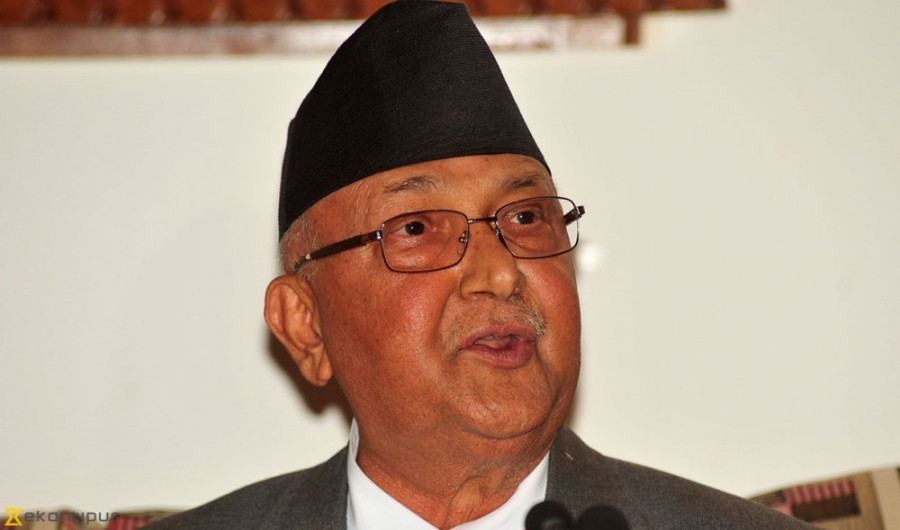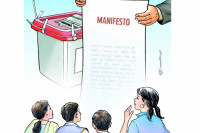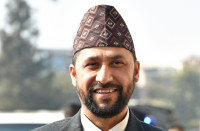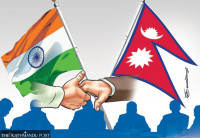National
Oli makes yet another remark that contradicts the spirit of federalism
Local government representatives demand that either the statute be amended or such comments need to stop
Prime Minister KP Sharma Oli, who has often faced criticism for his apparent reluctance to accept federalism, on Monday made remarks which, constitutional experts say, contradict the constitution and the spirit of federalism.
Inaugurating the laying of optical fibre in Dhading, Oli said that provincial and local governments were not separate entities, but units under the federal government.
“Nepal is one nation, one country and has one government—Nepal government. It has different subordinate agencies—seven provincial and 253 local governments,” Oli said, warning the other two tiers of government not to take “unnecessary steps”.
He claimed that provincial and local governments were trying to act as independent governments.
The remarks, constitutional experts say, contradict the fundamental principle of the Constitution of Nepal, which was promulgated with full support of the Oli-led party— the erstwhile CPN-UML.
The country is governed by the federal constitution, where all three tiers of government have equal status, but different responsibilities.
“All three tiers of government enjoy an explicitly autonomous sphere of responsibility and power,” Bipin Adhikari, former dean at the Kathmandu University School of Law, told the Post. “The federal government might have more authority but this doesn’t mean that provincial and local governments are its constituent governments”.
Ever since Oli returned to power after elections under the new constitution, which established Nepal as a federal democratic republic, he has undertaken measures that some say are aimed at centralising power.
Days after he became prime minister, Oli brought various government agencies directly under the Prime Minister’s Office, a move that was largely criticised by observers who said that Oli was attempting to centralise power.
The federal government’s attempts to prevent two sub-national governments from formulating laws, along with its continued presence in the provinces through subordinate offices formed prior to the promulgation of the constitution, have also met with widespread criticism.
Article 56 (1) of the constitution, under the Structure of State, says: “The main structure of the Federal Democratic Republic of Nepal shall be of three levels — federation, the state (province) and the local level” while the subsequent article says: “The federation, the state and the local level shall exercise the power of State of Nepal pursuant to this constitution and law."
“Oli, who is the executive head of the country, should refrain from making such light comments which only fuel the perception that he is against the fundamental spirit of federalism,” said Adhikari. “The prime minister may have made the comments as his party runs governments in six out of seven provinces and a majority of local governments.”
The federal government has claimed that it spent a year setting the foundation for federalism, but political observers believe its actions and words say otherwise.
Bhim Prasad Dhungana, general secretary of the Municipal Association of Nepal, an umbrella body of the municipalities across the country, said that despite repeatedly communicating their concerns, the federal government hasn’t stopped infringing upon their authority.
Article 232 of the constitution under ‘Relations between the federation, the state and the local level’ says: “The relations between the federation, the states, and local level [governments] shall be based on the principles of cooperation, coexistence and coordination.”
Though the constitution gives explicit powers to local governments to administer school-level education, the federal government is still recruiting teachers for local-level schools without coordinating with the former.
The federal government has also barred provincial governments from formulating rules and regulations — a move that has been challenged in the Supreme Court — even as it continues to retain its subordinate bodies — District Level Education Development and Coordination Units for instance.
In October, the federal government prevented provincial governments from formulating a Provincial Police Act.
Pushpa Kamal Dahal, co-chair of the ruling Communist Party, had even warned the Province 2 government of harsh consequences if it did not stop formulating the law.
“The ongoing pattern shows that the federal government wants to centralise power, curtailing the constitutional authority of other levels of government,” Dhungana told the Post. “I asked him [Oli] to either amend the constitution or stop making such unconstitutional remarks and actions.”
PM Oli’s commitment to federalism and republicanism has come under question time and again. While the country was fighting king Gyanendra’s direct rule, Oli made a controversial statement where he compared abolishing the monarchy to attempting to reach America riding a bullock cart. While withdrawing support for Oli’s 2016 government, Dahal had pointed to Oli’s lack of commitment to federalism. Dahal had also accused Oli of working against the spirit of the federal constitution.
“I believe the prime minister must explain to the public what his intention behind the remarks was,” said Adhikari. “The sooner, the better.”




 15.12°C Kathmandu
15.12°C Kathmandu














